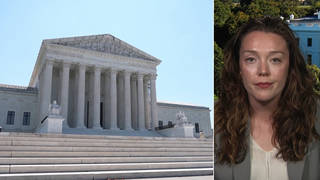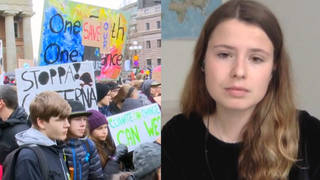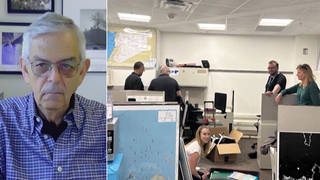
Guests
- Justine McCabethe co-chair of the International Committee of the Green Party of the United States.
- Dr. Joachim Denkingerthe deputy secretary general of the Greens Group in the European Parliament.
Green Party members from around the world have joined people from across the United States for the organization’s 2012 national convention in Baltimore. We discuss the Green Party’s global reach with Dr. Joachim Denkinger, deputy secretary general of the Greens Group in the European Parliament, and Justine McCabe of the International Committee of the Green Party of the United States. “I think we just recognize that something is moving in the U.S. in the Green field,” Denkinger says. “We have to strengthen the trans-Atlantic bridge, because, more and more, things will be decided on a global level.” [includes rush transcript]
Transcript
AMY GOODMAN: We continue our broadcast from here in Baltimore, Maryland, where the Green Party is hosting its 2012 national convention. Green Party members from around the world have joined people from across the United States. We’re joined here by one of them: Dr. Joachim Denkinger. He is the deputy secretary general of the Greens Group in the European Parliament. We’re also joined by Justine McCabe, co-chair of the International Committee of the Green Party here in the United States.
We welcome you both to Democracy Now!
JUSTINE McCABE: Thank you.
AMY GOODMAN: Joachim, let’s begin with you. The significance of the Green Party in Europe, a much greater presence than it is in the United States?
DR. JOACHIM DENKINGER: Yes, that’s true, unfortunately. We wanted to be as significant in the U.S. already as in Europe, but we have an electoral system which is really disadvantageous for small parties. I mean, the whole story in the development of the Greens in Europe was also due to the fact that we managed to go into parliament and go step by step into political responsibility. And this is different, of course, here in the U.S., where you have a majority voting system. And especially for the presidential campaign, it’s very, very difficult. I mean, this is something—before we went into government in Germany, it took us a long, long time. We were—
AMY GOODMAN: How long?
DR. JOACHIM DENKINGER: We were—created the first Green parties in Europe, popped up on a national level in '79 in Belgium, then ’80 in Germany. And so, it's a quite a long way.
AMY GOODMAN: And when did you go into parliament?
DR. JOACHIM DENKINGER: Into the parliament, it was ’83 in Germany and ’84 in the European Parliament, which you probably know is a parliament which represents the 27 member states of the European Union and where we represent with Green deputies 15, 15 different member states.
AMY GOODMAN: So, in the European Parliament, how many people are there, overall, and how many Green Party members?
DR. JOACHIM DENKINGER: Overall, we have 754, for the moment. It changes. We have 27 member states. Next year we will have 28, with Croatia coming to the European Union. And from the Greens, we have in our Green Group, which are not 100 percent Green everybody, it’s 49 pure Greens and 10 others who—with—have from—
AMY GOODMAN: Shades of green.
DR. JOACHIM DENKINGER: Shades of green, very deep green sometimes, but not formally a Green member party in a national state. And so we have 59.
AMY GOODMAN: What do you push for in the European Parliament?
DR. JOACHIM DENKINGER: Sorry?
AMY GOODMAN: What do you push for in the European Parliament? And what kind of power does the European Parliament have, anyway?
DR. JOACHIM DENKINGER: The European Parliament, which has been elected for the first time in direct election in '79 only, so it's a young parliament, has now quite a few legislative powers, in particular in environmental issues, financial services issues, data protection issues—things which are really dear to us. And I think we have done work to push also on the level of European Parliament some legislation, which is superseding the national legislation.
AMY GOODMAN: Like?
DR. JOACHIM DENKINGER: So they have to transpose it into national law. So it really—it matters what we can achieve on a European level, because it will have to be transposed on the national level.
AMY GOODMAN: And what are some of those issues you’ve pushed?
DR. JOACHIM DENKINGER: I mean, we have, for example, energy efficiency aims, so member states are now forced to achieve certain energy efficiency aims for electric appliances, housing, and so on. We have CO2 limits, which apply throughout the European Union, and other issues also.
AMY GOODMAN: What about economic issues?
DR. JOACHIM DENKINGER: Economic issues, we have not so many powers, because the economics—we don’t have what we call the co-decision. We are not equal with the council of the—
AMY GOODMAN: But in terms of what the Green Party pushes in Europe?
DR. JOACHIM DENKINGER: We push very much, and we were successful on the financial transaction tax, for example, where we have now an agreement that 12 member states, at least, will go on to introduce a financial transaction tax to work together. We couldn’t introduce it on the European level because the U.K. is still blocking everything on this fight. But we have this commitment from the 12 governments.
And we have, in the financial services sector, a lot of consumer protection issues, where we see that the transport of business in the financial sector is really so that the consumer can be sure that he has no disadvantages when he does business transport.
AMY GOODMAN: Justine McCabe, the significance of where the Green Party in this country stands in relation to the rest of the world?
JUSTINE McCABE: I think, because we’re an American party, U.S. party, we represent a lot of the war-and-peace kind of issues that—because our government is so on the fore of that. So, our party, for example, really pushes that, though it’s—nonviolence is a value that all the parties share. Our committee, the International Committee, works to relate to the other Green parties around the world. We learn from them, but—we have, again, shared values, but each cultural context is different. And so, we particularly will be interested in peace issues, for example, here about foreign policy, is our particular thing that we do for the party, in terms of developing foreign policy.
AMY GOODMAN: Why are you here at the Green Party convention in Baltimore, Joachim Denkinger?
DR. JOACHIM DENKINGER: I think we just recognize that something is moving in the U.S. in the Green field. I think it was never so interesting to follow the Green politics in the U.S., for example. We are a—since a couple of years, I think the Greens are a real factor. We have results in the States, which we’ve never had before—so, Jill, for example, but also Bennett in—good results in government election or in Senate elections. So, this is, for us, very, very important. And I think we have to strengthen the trans-Atlantic bridge, because, more and more, things will be decided on a global level, and we need to unite also as a political family on a global level.
AMY GOODMAN: Yesterday at the Green Party convention, Democracy Now! spoke to Richard Leckinger. He is a two-time Green candidate for parliament in New Zealand.
RICHARD LECKINGER: Hi, my name is Rick Leckinger, and I’m the National Policy Committee co-convenor for the Green Party in New Zealand. I’m here attending the Green Party U.S.A. convention in Baltimore, and I’m really excited, because in New Zealand we are going from strength to strength. We had our general election last year. We increased our vote by 58 percent. And that’s a further increase on 2008’s vote growth. And we’re really excited. We’re getting more and more strength, more and more membership, and the mainstream media is now referring to us as the legitimate party of opposition, and that thrills us no end.
AMY GOODMAN: Justine McCabe, are you looking at New Zealand? New Zealand, the Greens are being seen as the opposition party.
JUSTINE McCABE: Well, sure, we’re thrilled at their—at their success. You know, again, as Joachim was saying, we have this first-past-the-post system, which makes it very difficult. I think the grassroots organizing is essential. Jill and Cheri’s campaign really will augment that. But it’s real uphill battle, even compared to New Zealand. I mean, there’s—we have this system that you get—you know, you either win or lose. It’s a zero-sum system. So we are heightened—we are heartened, rather, by our Green colleagues around the world, but as Joachim was saying, because we don’t have proportional representation here, it’s a very difficult thing, it’s a very difficult system. But our approach and our value of grassroots democracy is the only way that we will succeed, eventually.
AMY GOODMAN: Joachim, final seconds. Your words of wisdom, your advice to U.S. Greens and those who are interested but just sort of looking?
DR. JOACHIM DENKINGER: Keep on going. Stick to your values. Don’t be afraid of power. Grasp it whenever you can get, because we want to change the world. We don’t want to be right afterwards; we want to change the world now.
AMY GOODMAN: I thank you for being with us. Our guests have been Justine McCabe, co-chair of the International Committee of the Green Party here in the United States, and Dr. Joachim Denkinger, who is the deputy secretary general of the Greens Group in the European Parliament.












Media Options